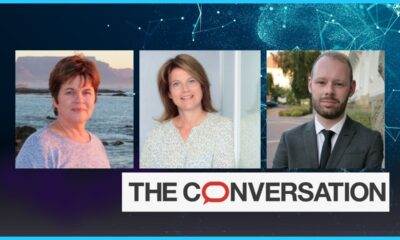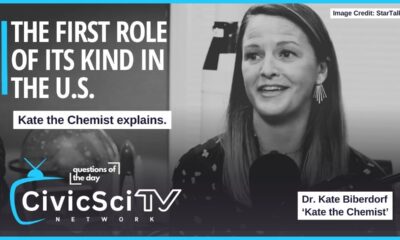Stories in Science Special Series
The Little Boat of “Why?”
Catherine Lockley: “As soon as this voyage is over, it will inform another and yet another. I signed up for the endless seas, but I stand at my bow and salute my fellow voyagers as they sail by on their own discoveries.”

Catherine R. Lockley
[su_boxbox title=”About”]Catherine is currently studying for her PhD at Charles Sturt University, and considers herself an Arts/STEM hybrid. When she is not busy attending Nutrition, Gastronomy and Science Communication conferences, she can be found learning as much about everything as humanly possible. In her free time, she runs a theatre company, Blast Furnace Theatre, grows and cooks heirloom vegetables, and belts out show tunes. She can be reached via LinkedIn, Twitter, or Facebook. This story was edited by Emily Sherman. [/su_boxbox]
[su_boxnote note_color=”#c8c8c8″]Key Points
- Keep following your own personal “why” — even if that just means to keep asking questions.
- Every thread in your journey is part of the rich tapestry of your research narrative.
- Beware of spurious separation of disciplines. Gastronomy and Nutrition can, and should, be partners in the existential ballroom of Science.[/su_boxnote]

Catherine R. Lockley
[dropcap]W[/dropcap]hen I first fell in love with words, I was only a lanky young child; a befreckled and tousled little girl who followed my father through winding trails in the Australian bush. My father was something of an amateur botanist (and Latin scholar), and thus he delighted in teaching me common and Latin names of the wildflowers we came across. Flannel Flower, for example, was also Actinotus helianthin, and Mountain Devil was Lambertia Formosa: There was a descriptive delight immediately followed by a secretive, enigmatic linguistic mystery. What did those words mean? Why were they given those names?
Although I was fascinated with botany during the day, story-time at night was filled with different types of beautiful words: C. S. Lewis, Yeats, Hans Christian Anderson, The Brothers Grimm. Words of beauty, words to make you shudder, words that wove a tapestry of images in a rich, soothing baritone. A little later this linguistic romance followed the glimmering lights of the stage. More words, but words I had to inhabit in theatre. Characters I had to build from linguistic skeletons. What do these words mean? To whom? Why?
I unpicked many “why’s” in theatre, music, and theory – sound, harmony, instrumentation, lyrics in beautiful foreign languages. I discovered that Beethoven made my blood surge and my heart beat faster, but Bach did not; I learned the mechanics of the pianoforte; I understood the anatomy and physiology of the voice. I learned that music was a form of time-travel, and that sometimes it was better than my words at answering questions.
So, I was an actor and musician who loved to ask questions about the natural world. I sought a place where I could keep asking why and be gently guided into asking it more effectively, and thus pursued graduate school. My journey to graduate school started around this the when I became a vegetarian, as I then discovered that food choices were both political and polarizing and endured a decade of people laughing, scoffing, correcting my erroneous assumptions, or telling me I was going to die from lack of iron or vitamin B12. Mostly they just wanted me to agree with their why. This drove me to study Nutrition Science at university in order to arrive at the best answers to my questions.
At university, a whole new ocean of “why’s” and words opened up to me. The ocean was limitless, full of enquiry that stretched in every direction, and I was a determined little mariner. Anatomy, physiology, chemistry, microbiology, genetics. Here was my beloved Latin again, and a place that actively encouraged my quest to answer questions.
In the midst of my quest though, a storm broke over the ocean and unanchored me. A storm with a rumbly voice, eyes like the sea and a mouth always twitching with amusement. He was a scientist who smelled of sunshine and biscuits. Together we loved food, words, stories, growing things, cooking things, and questioning things. We lived a long way apart so we mostly typed each other stories; stories that set blood and hearts aflame. This part of the story does not end well…he was somebody else’s “why.” I only borrowed him for a brief time, but the story must be told because it too informed my current path. I had a sudden subarachnoid hemorrhage and our story ended with hands clasped across crisp, white hospital linens and a huge scar of staples adorning my shaven skull. Even though he was painfully added to my very long list of questions with no answer, I was very determined to live and move on.
From Nutrition, I ventured into Science Communication. Why? Even though there is scientific evidence for what is healthy, national guidelines and dietitians, people were still becoming increasingly sick and overweight. At the same time, I could not name a single acquaintance that was not at least semi-obsessed with food. And, our obsession with food was only rivaled by our curious and parallel disconnect from it. I had a funny feeling (which I know now to be a hypothesis) that an important part of the answer was the story itself, and the words we used to frame the story. A good story will drape around your emotions like seaweed. It will stimulate the release of endorphins, cortisol, oxytocin and dopamine.
We humans are also hardwired to remember stories over facts. Can you start to see where these puzzle pieces are pointing? Let me ask you this: Have you ever lost your appetite for food when falling in love? Love is one hell of a beautiful story, one we tell ourselves and each other in a dizzy positive feedback loop. Added to that little cauldron is another curious scientific observation: Our orexigenic (hunger) hormones are not only controlled by what we eat (carbs/proteins/fats) but what we think we’re eating. People who think their meal is ‘indulgent’ or ‘hedonic’ see faster drops in Ghrelin (the hunger hormone), and faster rises in Leptin (the satiety hormone) regardless of the nutrient content of the meal. Neural pleasure pathways are not solely responding to nutrients, but to the story. Chefs and gastronomes have known this forever, but Nutrition Science has staunchly avoided the information. Bridging this gap through science communication, and telling a better story will help people make healthier, more intentional, and more joyful food choices. It’s high time we stopped letting marketing departments dominate our own food narratives. After all, their story is primarily one of profit, not your health or wellbeing.
As I continue to steer my bark across this endless ocean of “why’s,” I weave a thesis of words and health, of passion and pleasure, of physiology, neurophysiology and biochemistry, of food and narrative, and of the gut-brain-axis and the colonies of microscopic bacteria that can alter so much with the slightest shift or hostile take-over. Like Arachne, the weaver in Greek mythology who challenged Athena, I weave the threads of the story and attempt to find the symmetry that gives a strong answer to some of the “why’s.” Is there a pleasing resolution to the tale? A triumphant blow heralding the arrival of the voyager at safe port? Not yet, and possibly not ever. As soon as this voyage is over, it will inform another and yet another. I signed up for the endless seas, but I stand at my bow and salute my fellow voyagers as they sail by on their own discoveries. I keep a little book at hand, to trap the new “why’s,” to occasionally weep words and to press wild flowers.
Metrics
Sessions
Total number of Sessions. A session is the period time a user is actively engaged with the page.
Visitors
Users that have had at least one session within the selected date range. Includes both new and returning users.
Page views
Pageviews is the total number of time the article was viewed. Repeated views are counted.
The CS Media Lab is a Boston-anchored civic science news collective with local, national and global coverage on TV, digital print, and radio through CivicSciTV, CivicSciTimes, and CivicSciRadio. Programs include Questions of the Day, Changemakers, QuickTake, Consider This Next, Stories in Science, Sai Resident Collective and more.

-
Audio Studio1 month ago
“Reading it opened up a whole new world.” Kim Steele on building her company ‘Documentaries Don’t Work’
-
 Civic Science Observer1 week ago
Civic Science Observer1 week ago‘Science policy’ Google searches spiked in 2025. What does that mean?
-
Civic Science Observer1 month ago
Our developing civic science photojournalism experiment: Photos from 2025
-
Civic Science Observer1 month ago
Together again: Day 1 of the 2025 ASTC conference in black and white
Contact
Menu
Designed with WordPress
























